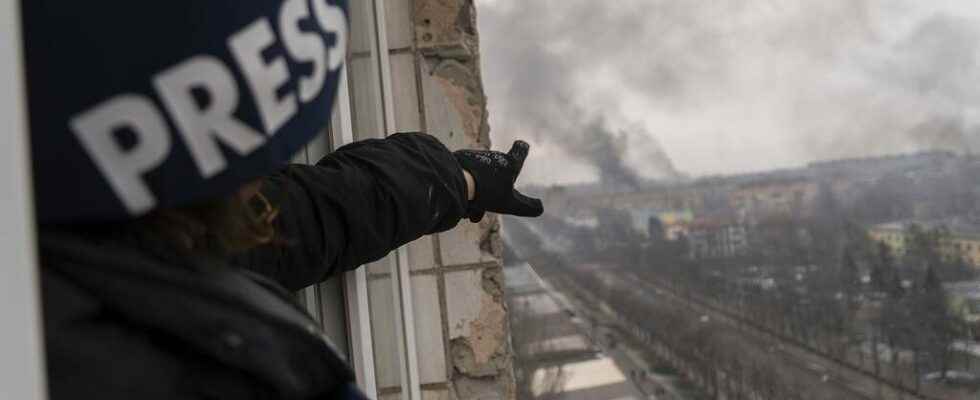Since March 5, after the start of the invasion of Ukraine, journalists accused of broadcasting “ false information about the army can be sentenced to 15 years in prison. Tuesday, May 3, on this World Press Freedom Day, RFI takes stock of its situation in Russia, where there seems to be little left of it.
Faced with threats from the Kremlin, the forced closure of many television and radio stations and the blockages of major social networks connected to the West – Facebook, Twitter, Instagram, etc. – many Russian journalists can no longer exercise their profession. Sergei Buntman works for Russian radio theEcho of Moscow. His station was banned a few weeks after the start of the invasion of Ukraine.
For him, these new restrictive laws have dealt a great blow to the freedom of the press: “ It is quite impossible, as an official media, to try to organize debates or discussions about current events. Ukraine’s aggression was a real turning point in the way he practiced his profession: The whole machine of repression has started. In stages, we closed the media like the Echo of Moscow or Dojd. New laws that provide for arrests and criminal prosecutions are yet another blow to the press. »
► To read also: War in Ukraine: “It is impossible to be a journalist in an independent media in Russia”
Alternate channel flooding
Despite all these violations of press freedom, many journalists continue to publish outside the official media. This is the case of Sergei Buntman who goes through the YouTube channel ofEcho of Moscow to continue to inform the public. A trend confirmed by Stéphanie Lamy, specialist in disinformation. She wrote the book Agora Toxica on this subject : ” There are some very interesting initiatives coming up. Whether it’s with advertising windows or whether it’s with the short wave radios that we knew during the Soviet era. »
Sergei Buntman wants to be more metaphorical in the creation of these alternative media: “ Barring this river of information, calm and professional, appeared dozens of small streams created by journalists. »
The goal according to Stéphanie Lamy? ” Reaching different targets of the Russian population to allow them to think more critically about what is delivered to them by the Kremlin. »
But if these channels are relatively easily accessible, often using digital tools such as VPNs, the Russian population does not necessarily go in search of this information. Sergei Buntman speaks of a kind of complacency in propaganda: ” It is quite possible to draw the desired information. But “wanted” is the key word. Because there are a lot of people who don’t want it. They find comfort in propaganda and in the one-sided information that airs on state television. »
► To read also: Freedom of the press, collateral victim of wars
The Russian population in the face of information
All the same, it remains difficult to sound out the Russian population on its desire to be informed. Stéphanie Lamy refuses to speak of a homogeneous block to evoke the Russian population: “ You have, of course, the elites. Those who are close to the Kremlin, who know very well that certain elements of language are false information. At the same time, you have other elites who are critics of power. »
Finally, Stéphanie Lamy identifies a third layer: “ You have a large part of the Russian population, remote and far from the centers of power, which receives the information as it has been validated by the Kremlin. »
The Dojd television channel, also closed since the beginning of the Russian offensive, clearly shows that a large part of the population is still trying to get information from free and independent media. Dojd’s YouTube channel, which broadcasts from Europe, garnered more than 20 million viewers for its first broadcasts in early March.
► Read also: RFI website blocked in Russia
Sergei Buntman stayed in Moscow to do his job as a journalist: “ We do our duty. It is a necessity to continue doing our profession. With his colleagues, he puts the ethics and deontology of his profession at the center of his work, which may seem paradoxical according to him: “ These social and popular media would not require professionalism with verified and verifiable, disputed and questionable information. On these platforms, it is very easy to become an activist. We are trying to preserve the profession, it is very important for the future because today journalism is completely destroyed. »
Faced with this situation, Sergei Buntman does not expect to be able to resume the antenna officially, on a national channel, as long as Vladimir Putin is in power.
